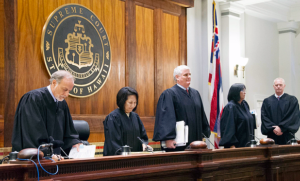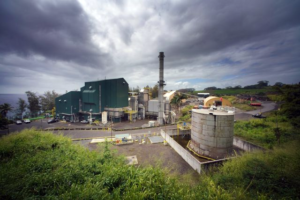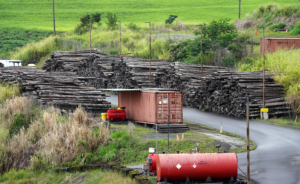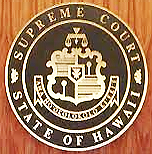The Hu Honua Saga Continues
Latest Hu Honua Hawaii Supreme Court Hearing
Since 2008, the Hu Honua biomass plant proposal has been bogged down in controversy and what seems as a forever and complex regulatory and legal fight over its proposed electricity costs, environmental, climate, and long term sustainability.
 The recent legal saga of Hu Honua versus Hawaii has been notable and was highlighted by insightful remarks during the hearing before the state Supreme Court. Justice Mike Wilson noted that the Hawaii State Legislature has declared a Climate Emergency and has since enacted a decarbonization law with strict new targets, further complicating Hu Honua’s viability, and the state PUC, in presenting the public and ratepayer interests, is required to review power purchase agreements in light of the new legislative changes.
The recent legal saga of Hu Honua versus Hawaii has been notable and was highlighted by insightful remarks during the hearing before the state Supreme Court. Justice Mike Wilson noted that the Hawaii State Legislature has declared a Climate Emergency and has since enacted a decarbonization law with strict new targets, further complicating Hu Honua’s viability, and the state PUC, in presenting the public and ratepayer interests, is required to review power purchase agreements in light of the new legislative changes.
Justice Wilson further pointed out that the PUC has an affirmative duty to follow the Public Trust Doctrine which is written into Hawaii’s State Constitution. All government agencies have an affirmative duty to follow it. It protects Hawaii’s natural resources. Our coral reefs, for example, are under immediate threat from climate change impacts driven by rising global greenhouse emissions. The change in law sets a much higher bar of review for Hu Honua and other power plant proposals in the state.
We may see these elements included in the Supreme Court’s opinion expected in March. This could have significant precedent-setting value in linking the new Climate Emergency and Decarbonization law to projects coming before the Public Utility Commission (PUC). Attempts to backslide and do fuel-switching for instance to protect existing “firm” power plants must be reviewed by this new standard. An emergency declaration means business as usual is not acceptable.
The attorney for Hu Honua (aka Hu Honua Bioenergy, LLC ) tried to tell the high court that the PUC had no right to consider the cost of their project on remand after the HELCO II decision.
This did not go over well with justices.
In legal terms; the burden of proof is entirely on Hu Honua
The original HELCO I ruling by the Hawaii Supreme Court also gave specific instructions on remanding back to the PUC. This went beyond just a GHG analysis, but also raised other legal responsibilities including the constitutional requirements. This was also true in the Hawaii Gas decision and the MECO opinion where the PUC also received clear directions from the high court. Hu Honua’s attorneys should have seen the clear direction of the court. Precedence had already been established in these other cases. The handwriting was on the wall.
 The Hu Honua attorney went on to make a veiled (threat) reference to vested property rights, but pulled back when pressed by the Court, by simply replying “…that is a discussion for another day.” It was an ugly moment. The implication was clear to the Court, Hu Honua sees the case far from finished, and may initiate further litigation in what appears to many as a forever legal battle that Hu Honua has already lost.
The Hu Honua attorney went on to make a veiled (threat) reference to vested property rights, but pulled back when pressed by the Court, by simply replying “…that is a discussion for another day.” It was an ugly moment. The implication was clear to the Court, Hu Honua sees the case far from finished, and may initiate further litigation in what appears to many as a forever legal battle that Hu Honua has already lost.
During the hearing, Sandra Wong, attorney for Tawhiri (which operates a wind farm at South Point), pointed out that if Hu Honua is allowed to go forward with its required “10 MW minimum generation dispatch contract” with Hawaiian Electric, that will result in a projected 60% curtailment of cheaper and less polluting renewables available on the grid. This is a shocking number. Wong further raised significant issues over Hu Honua’s GHG analysis used to justify their operation – issues, and points specifically raised and addressed in earlier remands before the high court. HELCO only compares GHG emissions from Hu Honua to fossil plants, rather than cleaner and less expensive renewable energy.
 Hu Honua also failed to include emissions from harvesting, transporting, or chipping the fuel. Even the Supreme Court justices picked up on Hu Honua taking credit for emissions after the 2045 deadline for 100% renewables which hugely cheats the numbers. Given the new state law on decarbonization, the PUC is required to go beyond such a flawed analysis.
Hu Honua also failed to include emissions from harvesting, transporting, or chipping the fuel. Even the Supreme Court justices picked up on Hu Honua taking credit for emissions after the 2045 deadline for 100% renewables which hugely cheats the numbers. Given the new state law on decarbonization, the PUC is required to go beyond such a flawed analysis.
The Hawaii Supreme Court will decide before Justice Wilson turns 70 and retires. It is not in the interest of the Court to keep hearing endless appeals just because an applicant doesn’t like the results of an agency ruling. It sets a horrible precedent. Instead, the Court will focus on whether the PUC met procedural steps on the latest remand, but more importantly. will always act in the public interest in their considerations. As Justice Wilson has pointed out, our Hawaii Constitution places an affirmative duty on the PUC that cannot be ignored. It is foundational to how they review all energy projects that come before them. The Climate Emergency declaration can not be ignored, the time for action is now.




Great article. Thanks.
So, what do Senators Dela Cruz, Wakai, and Inouye do?
Last year it was SB2510 (which Gov. Ige Vetoed)
This year it is SB72
Both afford a path for Hu Honua to circumvent the PUC (and thus the courts).
SB72 is, plain and simple, extremely bad energy policy in the disguise of legislative reforms. SB72 would clearly harm the advancement of lower cost, clean energy options. SB72 is anti-competitive and anti-democratic. It is also suspect.
The PUC is charged with representing and protecting the public interest. The courts are charged with seeking justice. Why is it, when Senator Dela Cruz and Sen. Wakai, and Sen. Inouye do not like the results from the PUC (and the Hawaii District, Appeals, and Supreme courts), IE., the process established to protect consumers (PUC) and ensure justice (the courts), that they attempt to seek the “deal” that SB72 affords to special interests? SB72 is a clear attempt to circumvent that due process and legal decisions.
I firmly believe that SB72 is the worst example of “Pay to Play” as demonstrated in the first Civil Beat article entitled “Hu Honua Lobbyist Hosted Fundraiser For Senators Who Were Key To Energy Bill” and describing Dela Cruz and Wakai’s SB2510.
Sen. Dela Cruz and Sen. Wakai, (aided by Sen. Inouye) attempted a similar ploy in the 2022 Session with their SB2510, which afforded another special deal for Hu Honua.
Sen Dela Cruz’s manipulation, threatening, and bullying tactics to pass SB2510 were the subject of the second article below, entitled “How A Powerful Lawmaker Forced Through A Contentious Energy Bill.”
In his wisdom, and responding to public outcry and whistleblowing, Governor Ige vetoed SB2510 with the comment that there was nothing good about SB2510
Must those of us, whom hire legislators to represent, continue to point out that overriding due process is anti-democratic?
The authors might claim to be focused on business, economic development, and energy security. They say they are worried about alternative energy not being reliable. They will claim falsely that biomass plants will be CLEAN, renewable, reliable firm power.
I firmly believe that these claims are distractions. In the case of Hu Honua, the PUC decided that Hu Honua was not what the authors claim. The courts have upheld that decision to date.
Whatever SB72 sponsors’ expressed motives are, SB72 is inconceivably short-sighted and contrary to the public interest. It IS, however in the interest of Hu Honua.
Hu Honua has demonstrated arrogant disregard for Hawaii state and county regulations and law (arrogantly building without the required permits and violating state energy and environmental policies, requirements, and laws). Hu Honua has instead used political contributions, PR misinformation campaigns, un-registered (illegal) lobbying, endless court appeals, and good-ol-boy backroom special favors and dealings to continue to stall, delay, disrespect, and circumvent the laws, regulations, and requirements that every other modern energy facility has followed. The PUC and the courts have spent thousands of collective hours indulging this spoiled, entitled, un-restrained, tantruming child that is Hu Honua. And yet, Sens. Dela Cruz, Wakai, and Inouye bring this SB72.
I suspect their tactics will be similar to those used with SB2510 last year.
It is time for Senators, who have integrity and conscience, and who place the interest of their constituents above a wealthy special interest (that has been found by the PUC to NOT be in the public interest – and legally supported by numerous court decisions) – it is time the rest of our legislators say ENOUGH.
The PUC is required to represent the best interest of the public. If only those behind SB72 were held to the same requirement. The PUC and the district, appeals, and supreme courts have to date acted judiciously, fairly, and expediently in upholding this requirement and trust. To remove this permitting process is to simply remove the public’s best interest.
I personally believe that SB72 (and SB2510) authors should be held responsible for this bill and their actions, ESPECIALLY in this time of Legislative Ethics review, oversight, and suggested changes to rebuild the public’s ailing trust.
Please google and read these 3 very important and relevant Civil Beat” investigative reports that inform and document my statements.
“Hu Honua Lobbyist Hosted Fundraiser For Senators Who Were Key To Energy Bill”
“How A Powerful Lawmaker Forced Through A Contentious Energy Bill”
“Out-Of-Bounds? NBA Star Kevin Johnson Pushes Hard As Point Man For Hawaii Energy Project”
Well said, David! I hope you get this printed in the local papers!
As to: “The authors might claim to be focused on business, economic development, and energy security.” Yes, such distractive ‘explanations’ abound when covering up deeper agendas. In the case of national issues, scoundrels will at a last resort appeal to pubic fears with warnings of NATIONAL SECURITY being at stake!